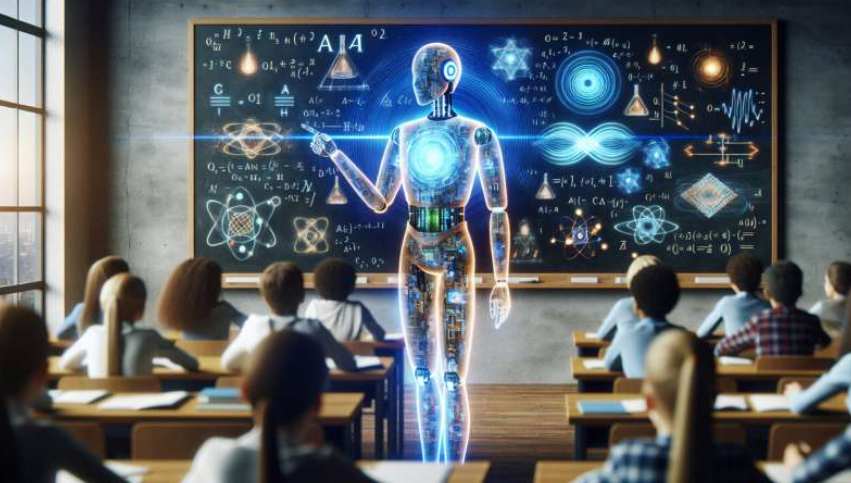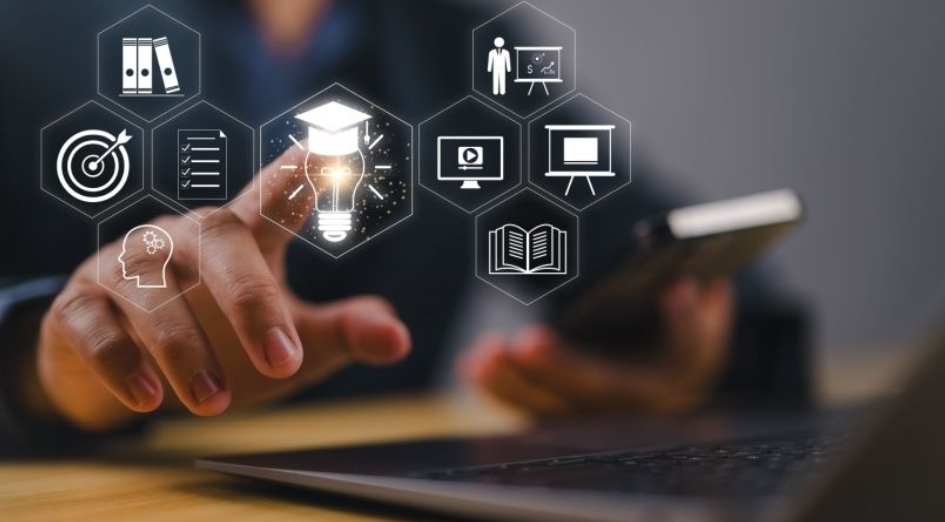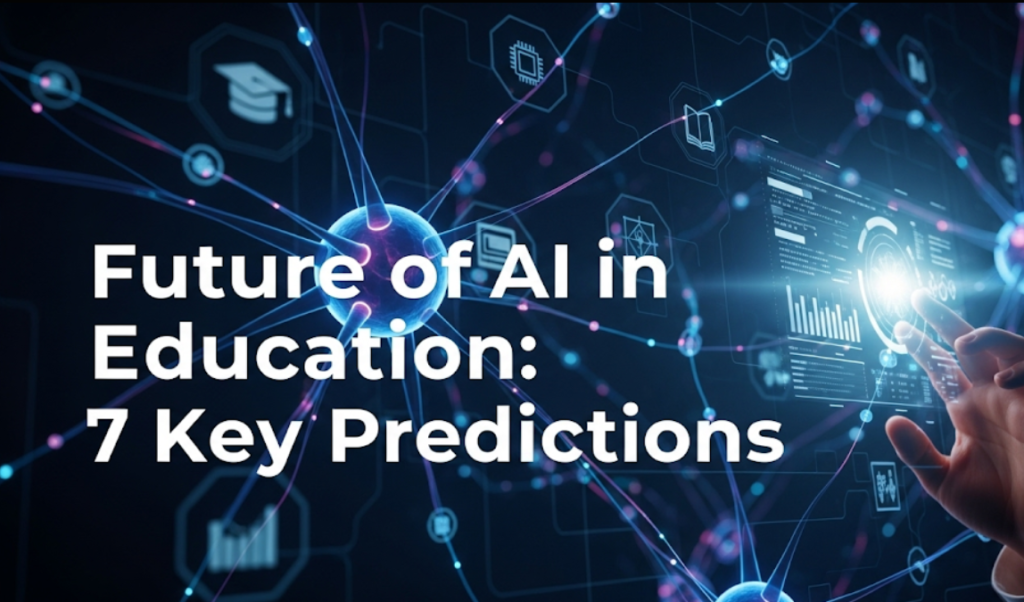Intelligent Classrooms are Here to Stay
Learning is a rapidly changing world. The use of AI in education is no longer a science fiction film fantasy. It is happening in schools all over the world.
Students breathe smartphones and tablets. They are hoping that technology will make things a lot easier and enjoyable. Schools are beginning to get in on this digital tide.
AI tools are enabling teachers to be better teachers. Students are discovering new methods of learning which suit them personally. Parents are watching their children get excited about homework.
This paper examines seven significant trends regarding the future of AI in education over the next few years. This will impact each and every student, teacher, and school system globally.
Prediction 1: AI Tutors Will Be Used in Place of One-Size-Fits-All Learning
Each Student Has His/Her Own Digital Teacher
Just imagine having a tutor who understands how you learn best. This AI tutor knows that you are great in math but in reading you are not. It understands that you are more of a picture person than a word person.
In certain schools, they are already testing personal AI tutors. These digital teachers can:
- Vary the lesson pacing according to student pace
- Give more practice on challenging subjects
- Praise accomplishments in order to increase confidence
- Give hints but not answers
Achieving Realistic Learning
Classroom learning does not allow all the students to learn differently. Other children become bored due to the slow pace of the lessons. Some lose their way as all the things go too fast.
The problem is resolved with the help of AI in education which generates personalized learning paths. Every student has his way and has his route. There is no longer any need to wait till classmates catch up. No more falling behind.
Students with interest in science will be able to explore more of the experiments in chemistry. Individuals that like art can learn about creative writing assignments. When learning fits their interest and capabilities, everyone is a winner.
Prediction 2: Intelligent Content Creation Makes the Learning Content Perfect
Textbooks That Write Themselves
Teachers waste countless hours planning lessons and worksheets. AI will soon take care of much of this work automatically.
Intelligent content development systems will:
- Create problems of the appropriate difficulty
- Write reading passages of interest to the students
- Use visual aids in explaining complex issues
- Turn materials into other languages just in time
Adaptable Learning Materials
Existing textbooks are static. They include the same information for all students. Learning content powered by AI will be different.
These intelligent resources will vary depending on who is reading them. A student with a problem in fractions will find additional examples and explanations that are easier. Advanced learners will get bonus problems that are challenging.
The material shall also be progressive in respect of new developments and discoveries. The latest research will be contained in science textbooks. Learning materials will be used to relate the past with the present news.
Prediction 3: Stressful Testing is Replaced by Real-Time Assessment
No More Surprise Tests
Many students are anxious to take traditional tests. They research and write a big exam and anxiously await grades.
This system is transforming with AI in education. As an alternative to the rare large-scale exams, students will undergo ongoing assessment.
Smart systems will track learning progress on a daily basis, by:
- Games based on interactive exercises
- On-site inspections
- Problem solving analysis among students
- Time tracking of the various topics
Immediate Feedback Helps Students Improve More Quickly
Students are not aware of their errors on traditional tests that they commit until it is too late to correct them. AI evaluation generates instant feedback.
Students are able to rectify their mistakes immediately and learn through their errors. This works like a positive cycle wherein learning becomes more efficient and swift.
Real time data is also useful to teachers. They are able to identify struggling students at a glance and offer assistance before things get out of control.

Prediction 4: Virtual and Augmented Reality Change Classroom Experiences
Learning Through Immersion
It is interesting to read about ancient Rome. It is hard to forget walking in a virtual Roman forum.
Abstract concepts will become tangible with the help of VR and AR technologies based on AI. Students will:
- Study the interior of human cells in biology
- Observe the course of history
- Speak to AI partners using foreign languages
- Safely perform dangerous chemistry experiments
Breaking Physical Barriers
Laboratory equipment is not cheap and not all schools can afford it. Lots of students are living very distant from museums and cultural sites.
Virtual reality removes these restrictions. A school in the town of Montana can take students on virtual field trips to the Louvre Museum in Paris. In cities, schools have the opportunity to investigate pure wilderness.
The use of AI in education renders these experiences not only educational but interactive as well.
Prediction 5: Intelligent School Management Systems Automate Processes
Administrative Business is Automated
School principals are now wasting time on red tape and data input. Automated AI systems will do routine administrative work.
Such intelligent management systems will:
- Arrange classes according to the needs of the students and the availability of the teachers
- Monitor attendance and discern trends
- Supervise school funds and distribution
- Organize parent-teacher interactions
Data-Driven Decision Making
Schools collect large volumes of data regarding student performance, attendance and behavior. Most of this data is now sitting in filing cabinets.
AI will convert this information into actionable insights. The principals will determine what teaching practices are effective. District administrators will use resources more efficiently.
Parents will be provided with comprehensive reports concerning the progress of their children in all areas and activities.
Resource Optimization
Intelligent systems will anticipate when equipment will break down and prevent it. They will maximize energy consumption to cut down on costs. They will even recommend the most appropriate times to hold crucial meetings depending on everyone’s availability.
Prediction 6: AI-Powered Language Learning Overcomes Communication Barriers
Fluency Through Conversation
Conventional language classes are textbook and memorization-based. Students are taught grammar rules, and are unable to conduct authentic conversations.
Conversational AI partners are transforming language learning using AI in education. These chat buddies:
- Make unlimited chances to speak available
- Correct pronunciation in real time
- Modify the challenge according to student achievement
- Always be patient with mistakes that are repeated
Integration of Cultural Contexts
Language learning is not just studying vocabulary and grammar. It is also important to understand cultural context.
Cultural lessons will be incorporated into the conversation practice effectively by AI language tutors. Mexican festivals will be discussed as students study the basics of verb tenses in the Spanish language. Students of the Japanese language will learn about social etiquette and learn polite phrases.
Accessible to All Students
Existing language courses either involve costly software or individual tutors. Language learning via AI will be cheaper and simpler.
Remote locations will experience the same quality of language instruction as is experienced by students in major cities. This democratization of language education will raise up more internationally connected graduates.
For more insights on how AI technologies are transforming various industries, including education, this trend represents just one aspect of the broader artificial intelligence revolution.
Prediction 7: Predictive Analytics Prevent Student Dropouts
Early Warning Systems
Most school dropouts show indicators weeks, months, or years before dropping out. Unfortunately, these symptoms are not always noticed in time.
AI will examine trends in student performance and behavior to early detect at-risk students. These predictive models will take into consideration:
- Reduction in grades in several subjects
- More absenteeism and lateness
- Less involvement in classroom activities
- Modifications in social relations with peers
Individualized Intervention Plans
Through the identification of at-risk students, AI will be used to suggest specific intervention strategies depending on the unique situation.
Certain students require academic tutoring. Some need social, emotional support. Some of them could use an alternative learning setting or career exploration courses.
AI in education also makes sure every student does not slip through the cracks through timely and personalized help.
Tracking and Adjustment of Success
The failure of intervention programs is usually due to their not being effectively monitored. The success of support approaches will be monitored by AI systems and altered accordingly.
In case one certain tutoring strategy is not producing positive results, the system will suggest alternatives. This optimization is ongoing so that the most efficient help can be provided to every at-risk student.
Table of Benefits and Challenges
| Benefits of AI in Education | Challenges to Solve |
|---|---|
| Individualized learning experiences | Data security issues and privacy |
| Better student interaction | Digital divide and access problems |
| Effective use of resources | Training of teachers |
| Real-time progress tracking | Costs of initial implementation |
| Increased accessibility | Fears of job loss |
The Human Factor is Still Vital
Educators Become Learning Facilitators
Others fear that AI will entirely take the place of human teachers. This fear is unfounded. Rather, AI in education will turn the role of teacher from information provider into learning facilitator.
Educators will have less time to waste on mundane activities such as grading and administration. They’ll have more time for:
- Individual mentoring with students
- Creative lesson planning and innovation
- Social and emotional support
- Critical thinking skill development
Developing Social Skills and Emotional Intelligence
AI can be used to impart knowledge of facts and processes. But humans are great at learning how to be empathetic, collaborative, and emotionally intelligent.
The importance of these “soft skills” is beginning to rise in the workplace. Human teachers are required to be role models to students and to shape their social growth.
The efficiency of AI and human wisdom are the perfect pairing to form the ideal learning environment.
Preparing for the AI Education Revolution
Infrastructure Development Requirements
Schools will need to be ready to see AI in extensive use and improve their infrastructure. This includes:
- High-speed internet connections in classrooms
- Devices for all learners and educators
- Secure networks to store student data
- Technical personnel for maintenance
Professional Development for Teachers
Teachers should be trained how to make use of AI. The programs of professional development should be aimed at:
- Learning about the capabilities and limitations of AI
- Incorporating AI tools in current courses
- Maintaining the human aspect in digital spaces
- Securing student privacy and data
According to UNESCO’s latest report on AI in education, proper teacher training is crucial for successful AI implementation in educational settings.
Ethical and Policy Implications
Governments and schools need to create AI-related policies in education. Key considerations include:
- Data privacy concerning students
- Preventing algorithmic bias
- Equitable access to AI tools
- AI transparency
AI Education Adoption Timeline
| Period | Developments Expected |
|---|---|
| 2024-2026 | Basic AI tutoring systems become normalized. Virtual reality/augmented reality integration in large school districts. |
| 2027-2029 | Predictive analytics are broadly used. |
| 2030-2035 | Full AI-based learning ecosystems |
Frequently Asked Questions

Are human teachers going to be replaced by AI?
No, AI will not replace human teachers. Rather, it will expand their abilities and liberate them to focus on mentoring, emotional support, and creative instruction that can only be done by humans.
What about AI in education privacy?
Schools using AI systems should adhere to effective data protection measures. This involves encrypted data storage, restricted access rights, and transparent policies regarding the use of student data.
What about students without access to technology?
The digital divide is a major issue. Collaboration between governments and schools is required to facilitate equal access to AI-powered learning tools by providing all students with access to devices via device lending programs and enhancing internet accessibility.
What will AI education tools cost?
Initial costs can be expensive, but AI tools will likely become less expensive over time. Initial investment will likely be covered by long-term savings due to efficiency and better outcomes.
Will AI be useful for students with learning disabilities?
Yes, AI promises a lot in assisting students with learning disabilities. Individual learning platforms are capable of supporting various learning styles and specializing in learning conditions such as dyslexia and ADHD.
What effect will standardized testing have with AI?
Standardized tests are most likely to become more customized and specific. Instead of general exams, AI will develop personalized tests that will be more accurate in evaluating student progress.
What skills do students need to be equipped with to compete in an AI-powered education system?
Students are encouraged to work on critical thinking, creativity, emotional intelligence, and digital literacy. These skills complement AI capabilities and are distinctly human.
The Bright Future Ahead
The future of AI in education is very bright. These seven predictions are only the tip of the iceberg in a significant change in how we learn and teach.
Students will be taught individually in a manner that suits their requirements and interests. Educators will have great tools to help every child succeed. The running of schools will be very efficient and effective.
The transformations will not be immediate. It will require time, planning, and major investments. Nonetheless, it is worth doing since it will be beneficial to students, educators and the community in general.
Our education system is shifting to one that is truly service oriented to all learners. AI-powered technology will assist in building classrooms where no children are left behind and each student has an opportunity to fulfill their potential.
The revolution in education has already started. Individuals who adopt these changes will be at a great advantage to succeed in the AI-powered learning environments of the future.

